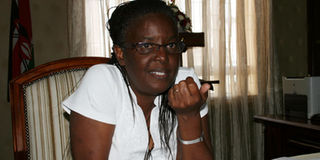Murugi defended over HIV remarks

Special Programmes minister Esther Murugi. MPs who attended an HIV and Aids workshop she was quoted as having said people with HIV should be segregated came to her defence saying she was quoted out of context February 9, 2011. FILE
MPs who attended an HIV and Aids workshop where Cabinet minister Esther Murugi was quoted as having said people with HIV should be segregated came to her defence Wednesday saying she was quoted out of context.
And in a statement to the House, the Special Programmes minister said she only put across the Cuban case of incarceration to foster discussions and debate and never intended to imply that Kenya should adopt a similar strategy.
“This would be contrary to many human rights conventions that Kenya has signed,” she stated, adding that ultimately such an approach would also not be successful in controlling the epidemic.
Her alleged statement sparked an outcry and harsh criticism from rights groups and individuals. Among those who harshly criticized the alleged statements was First Lady Lucy Kibaki who asked the public to ignore what she described as impractical and retrogressive public utterances that threaten to erode achievements in management of HIV and Aids.
She said over 1.45 million Kenyans currently living with HIV deserve care, love and compassion and not confinement or seclusion.
Prime Minister Raila Odinga also distanced the Government from the alleged statement.
Yesterday, the Minister said Kenya has achieved great strides in management of HIV and scaling up services to prevention, care and treatment, with a current prevalence rate of 6 per cent among adults down from 14 per cent in 1990s.
That notwithstanding, country continues to record an average of 122, 000 new infections with couples in heterosexual relationships making up the bulk of the infections.
Referring to Sessional Paper Number 4 of 1997 on Aids in Kenya and HIV and AIDS Prevention and Control Act 2006, the Minister said the Government policy was clear and outlaws discrimination of persons with HIV.
She also quoted Section 33 (2) of the HIV and Aids Prevention and Control Act which states that no person shall be quarantined, placed in isolation, refused lawful entry or deported from Kenya on the grounds of their actual, perceived or suspected HIV status.
“The laws prohibit discrimination on grounds of HIV status, supports the rights of people living with HIV to participate as full actors with dignity and the right to treatment of HIV as part of the right to the highest attainable standards of health.
The Minister was quoted at the workshop that was organized for MPs on January 28 as having said people living with HIV should be isolated.
She was updating members on the progress made and challenges in national response programmes.
She explained that during the participatory discussions and contributions, she provided examples of other countries that have tried to control the epidemic, citing Cuba’s case in 1988 when it incarcerated people with HIV after a massive testing campaign.
She told the House she had informed the meeting that Cuba has always had a very low prevalence rate and very low new infections and in that way, was very different from Kenya.
Cuba withdrew the policy in 1993.
She also cited Rwanda whose prevalence rates have reduced from a peak of 11 per cent in the 90s to 2.8 per cent in recent times.
“In these countries, universal access and country ownership drive the HIV response thus the low HIV incidences and lowered Aids related deaths,” she stated.
MPs who attended the meeting said she was quoted out of context.
Chepalungu MP Isaac Ruto and Bonchari MP Charles Onyancha said they had understood the context under which she had spoken.
“What she said was taken out of context, the press has a strange way of using clips to actually peddle lies,” Mr Ruto said.
“Some of us who were in Mombasa, understood, she was seeking guidance on how to contain further spread of HIV,” said Mr Onyancha.
The minister said she had been wondering where the MPs who attended the workshop had disappeared when she was being “crucified.”
“This has caused me a lot of stress, because I have many good friends who have died of HIV and I have relatives who have HIV,” she said.
The Minister indicated that currently only 57 per cent of Kenya’s adult population has ever tested and this is a cause for concern.
“Controlling an epidemic of this magnitude where 1.5 million people are living with HIV requires a massive scale up of people accessing testing and counselling and disclosing to their sexual partners and accessing a range of prevention services,” she stated.
She stated that while she continues to support the view that Kenya looks at other countries approaches and learn from them in order to rid Kenya of HIV, protecting and promoting human rights will encourage people to come forward and access services and reduce stigma associated with the epidemic.




